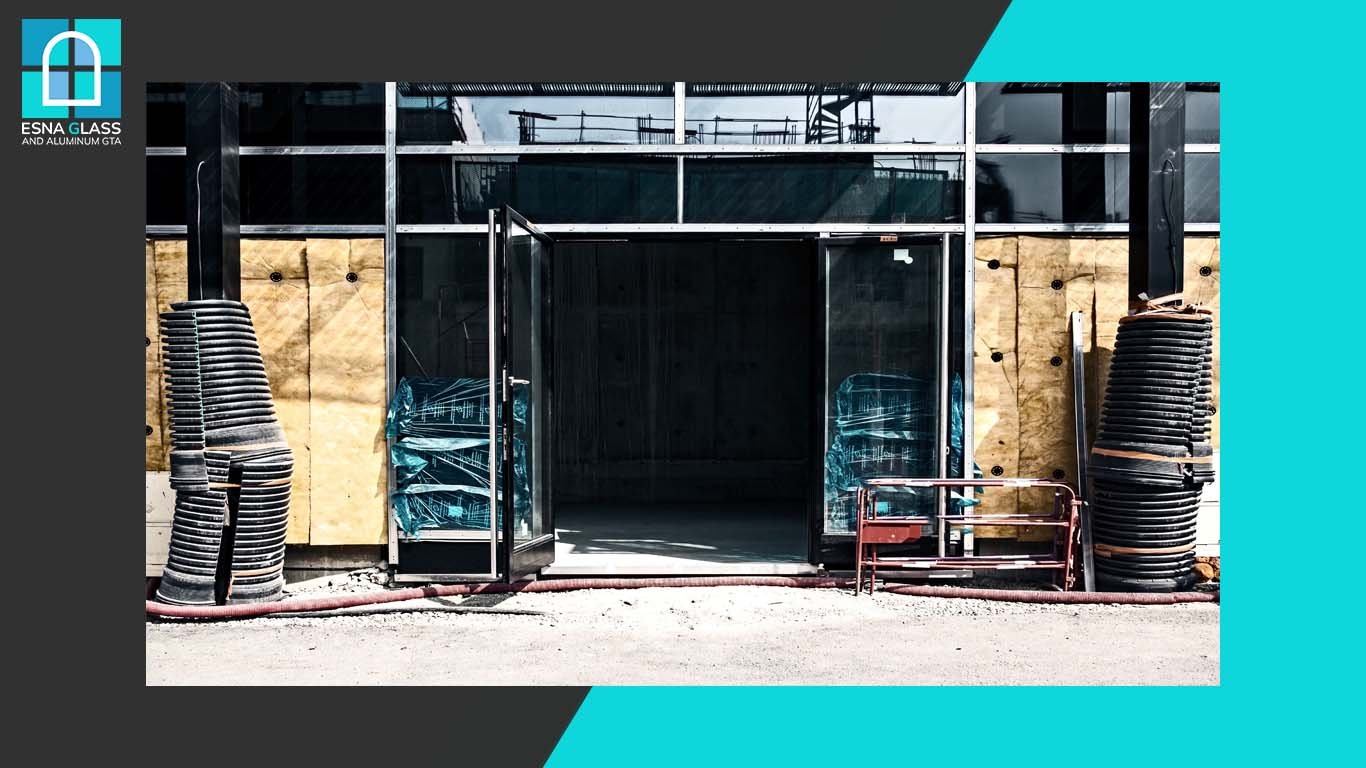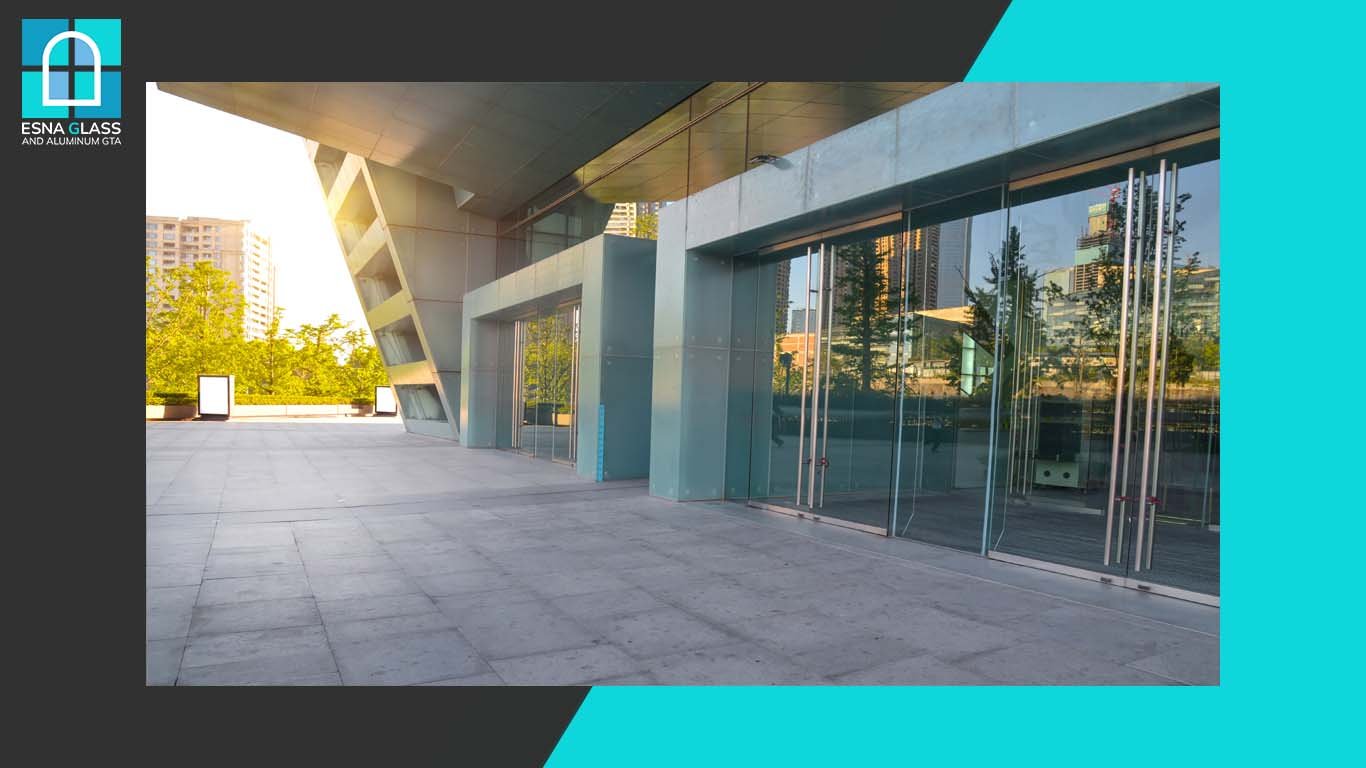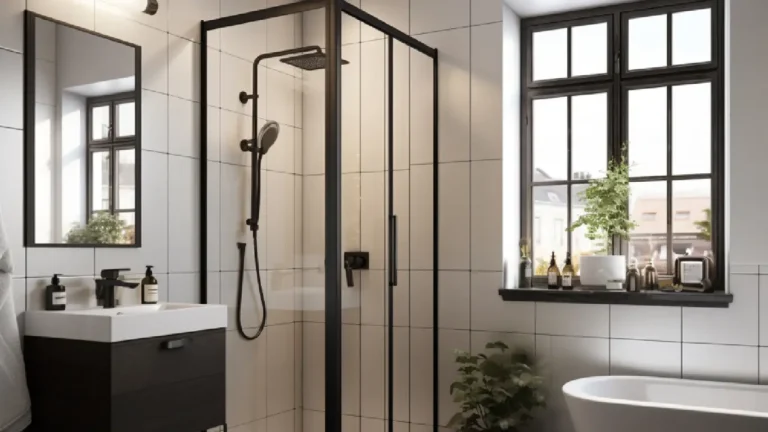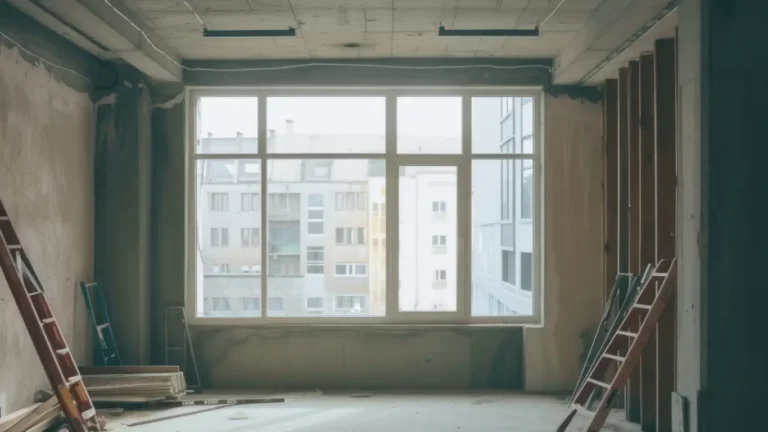Are you thinking of giving your firm a sleeker, more modern appearance? Have you considered the benefits of commercial storefront installation? Perhaps you’re considering the endurance and visual appeal of an aluminum storefront installation.
Welcome to our blog post about storefront installations. Here, we’ll examine why a well-designed storefront is more than just a show—it’s an important part of your brand’s identity.
Importance Of A Well-Designed Storefront For Businesses
A well-designed storefront is critical for businesses since it is the first point of contact with clients, reflecting the brand and enticing passersby. It improves consumer experience and behavior, increases brand identification, and promotes sales, making it essential for sales success.
Types of Storefront Systems
- Transparent Glass: It is a transparent, see-through form of glass. It draws the bystander’s attention to your highlighted or specified stuff. It is commonly used to highlight the beauty of an object, such as beauty products or clothes stores. It is the appropriate installation for a small business.
- Commercial Stained Glass: This glass comes in various colors and textures. It is used to signify that the shop has a distinctive look for a festival or celebration. We also provide bespoke patterns and design options to help you create your ideal dream shop.
- Tinted Glass: The tinted glass storefront gives the establishment an excellent, darker appearance. Tinted glass is the best option if you don’t have enough shades. It also provides seclusion for the shop.
- Frosted Glass: This glass style keeps the office well-lit while maintaining privacy. Its foggy surface lets dim light penetrate the room while keeping the other items hidden.
- Safety Glass: This glass securely holds the lock against a robber’s assault. If someone tries to force open the door, the lamination will hold the glass in place and prevent it from breaking.

Commercial Storefront Glass Options for Your Business
There are numerous possibilities for commercial storefront glass:
Transparent —Transparent glass is a popular choice for retail and restaurants to attract customers and display their offerings.
Tinted—Depending on what you want to exhibit, a tinted option may be more appropriate for your business.
Frosted—This can provide the most privacy for your storefront if you want to expose select parts of the business and its products.
Tempered —Tempered glass is commonly utilized as business storefront glass due to its durability. This glass will suit your store’s construction and safety regulations. Tempered glass is four times stronger than annealed glass, another form used for storefront windows.
Essential Tips for Commercial Storefront Door Repair
Your door is frequently the first thing people notice about your establishment. Keeping it in top condition will help you attract new consumers and keep your regulars returning. When you see a minor repair issue, you must fix it immediately.
A lock isn’t latching correctly
If your door isn’t locking properly, check the strike on the frame. This aperture is an ideal site for dirt and debris. Employees and clients may leave rubbish or bits of paper in these spots, rendering the lock ineffective.
Regularly inspecting your door striking for clutter will keep them clean and guarantee that your locks function properly. Your door will latch without putting additional pressure on the latch or door closer.
Electronic Locks Malfunction
Like any other battery-operated device, electronic locks must have their batteries checked once a year. Most locks will continue to operate on a single battery charge until they break or rust occurs. These batteries need to be changed straight away.
Even if the lock appears operational, you may be unaware of a leaking battery inside. You may need to purchase a replacement door if there is significant damage.
Slow Closing Doors
The door closer is an essential piece of hardware for your entryway. Check your door regularly for any leaking fluid escaping the closer. This indicates that the hydraulic seal has failed, and the closer requires replacement.
Replacing it during regular business hours will save you money over phoning a locksmith after hours. Keeping an Allen wrench available will make any essential changes easier.
If your door closes too violently, the frame, lock, and other hardware may be damaged. Closing too slowly may cause the door to not lock properly, putting your facility at risk.
Door Starts Sticking
Your business doors require lubrication to function correctly. If your doors start sticking, oil the hinges, latches, and bolts. This allows them to move freely and protects them from damage.
If your door remains challenging to use after lubrication, it may have rusted components that require cleaning or a more extensive repair. Call a professional door repair service to evaluate the condition of your door.
Loose bolts
Commercial door bolts may loosen with time. If this problem is not resolved, they may fall out and inflict significant damage to the door or, worse, anyone who uses it.
Check for loose bolts regularly and tighten them as needed. This will prevent future damage to the door. Moving forward, you will need to monitor these bolts more frequently.
Damaged seals
Your door seal will eventually wither away. Keep an eye on your current seal and replace it as soon as it shows indications of damage. Replacing it is critical since it improves your building’s energy efficiency and prevents sound from entering and leaving the space.
Jamming Door
Paying attention to your door will help you detect any problems. One such issue is when it becomes jammed. A jammed door is easily damaged and must be adequately cared for. You may need to remove any rust, dirt, or debris from the door.

Commercial Aluminum Storefront Installation (Step-By-Step)
The installation of a commercial aluminum storefront typically consists of several critical components. Here’s a summary of the process:
- Design and Planning: This initial process consists of measuring the storefront space, selecting a design, and developing the layout of the aluminum storefront system1.
- Materials Selection: The appropriate type of aluminum and glass will be chosen to meet the storefront’s aesthetic and functional needs.
- Fabrication: The aluminum frames and glass panels are made according to the shop’s designs. The storefront system can be assembled using typical methods such as screw spline and shear block.
- Removal of the existing storefront: Existing storefronts will be carefully removed before the new ones are built.
- Installation: The new metal components and glass panels have been installed. This phase demands accuracy and should be completed by a professional installer to ensure a correct and secure fit.
- Sealing and Finishing: After installation, the storefront is sealed and polished to protect against the elements and increase energy efficiency.
- Cleanup and Inspection: The next step is to clean up the installation site and evaluate the new storefront to confirm that everything is installed correctly and functions properly.
Commercial Storefront Glass Replacement Process
- Assessment: The first step in replacing storefront glass is to inspect the existing glass thoroughly. Experts will look for chips, cracks, or signs of wear and tear. They will also consider factors such as the type of glass, the condition of the frame, and overall structural soundness.
- Customization: Experts will work with you to adapt the replacement glass to your company’s requirements. This process includes selecting the suitable glass type, thickness, and other characteristics such as tinting or UV protection.
- Removal: The old glass is removed once the bespoke glass is ready. This sensitive process keeps surrounding structures, like frames and mullions, intact. Careful removal reduces the likelihood of damage to the storefront during the replacement operation.
- Installation: The new storefront glass is skillfully placed after removing the old glass. Professionals pay close attention to detail, guaranteeing a perfect fit and good sealing to improve the storefront’s aesthetics and functionality. The installation process is quick, reducing downtime for your organization.
- Cost Considerations: Replacing Storefront Glass Replacement is a long-term commitment to your company’s growth and standing. Although the initial costs may appear high, the benefits of increased security, lower energy use, and esthetic appeal must be weighed. Over time, these benefits may increase customer foot traffic and a positive return on investment.
- Choosing The Right Professional: Replacing storefront glass is a specialized undertaking that requires experience and accuracy. When selecting an expert for the assignment, consider client feedback, reputation, and expertise. A reliable and competent glass replacement service can ensure a smooth process from examination to installation.
Types of Commercial Storefront Doors
When planning your business door installation job, you should consider numerous factors, the first of which is deciding on the type of material you want for your storefront. While there are many possibilities, we’ll focus on the three most popular materials for good reason.
Aluminum Storefront Doors
- Aluminum is becoming a more desirable and extensively utilized material for storefront doors. Aluminum is a lighter and more cost-effective alternative to metal that is similarly robust and requires no maintenance.
- It also has the added benefit of being highly corrosion-resistant. Your storefront will be less likely to rust and decay as it matches the elements and time. Cleaning your storefront will be easy and quick, ensuring it constantly looks fresh.
- Choosing aluminum will also be the most environmentally responsible option while maintaining your company’s integrity and security. Metal can be recycled indefinitely without deteriorating, and the recycling process uses significantly less energy and resources than creating new metal from scratch.
- This benefit is passed on to you through cost savings and the assurance that the supply chain can always meet demand.
Herculite Storefront Doors
- Herculite doors are another sleek and modern choice that exposes the interior of your store.
- Herculite doors are glass doors. They are typically frameless and can be locked using maglocks. Pull handles and disguised door closers are usually used on the inside and outside.
- This option is particularly appealing for businesses such as boutiques, jewelry stores, and others who rely on the design of their products to attract clients. Herculite doors elevate window shopping by proudly advertising your business to customers passing by.
- Furthermore, seeing your business bustling with activity can entice potential consumers to learn more about your offer.
- Herculite doors also allow more natural light to enter your business. There is no substitute for the sun’s natural rays; keeping your store well-lit and friendly is part of enticing clients.
- Glass doors are also more practical in locations with significant mobility or traffic, mainly if oversized packages are transported in and out of the business.
- Automated sliding glass doors and an automated door opener provide hands-free and easy opening and closing. They also allow customers and employees to see who is exiting or entering, thereby reducing collisions.
- When deciding on a material for your storefront doors, consider both your aesthetic preferences and the day-to-day necessities of your building. This will be critical for making a confident purchase to ensure your business flourishes and looks its best.
Hollow Metal Storefront Doors
- Metal storefront doors, often constructed of steel, add a sleek and modern look to your business. This keeps your business looking new and fresh, allowing you to stand out in a crowd of older establishments that use materials like wood.
- Metal components offer a solid foundation for security and are the most lasting of all your alternatives. Steel is frequently favored for loading areas, back doors, and safe access or exit points. Although less elegant, steel’s tried-and-true ability to withstand harm makes it a dependable choice.

Commercial Storefront Installation Cost In Canada
Commercial storefront installation costs in Canada vary depending on several factors, including door type, size, configuration, hardware, and installation services. Here are some general estimations for the various types of storefront doors:
- Aluminum storefront doors cost $1,500 to $3,500.
- Glass storefront doors cost $3,000 to $5,000.
- Steel storefront doors: $2,000-$4,000.
- Automatic sliding doors: $5,000 to $10,000.
Commercial Storefront Installation Near You
If you want to improve the aesthetics and security of your business, consider installing aluminum storefront windows. They not only appear sleek and modern, but they are also more durable and energy efficient.
Esna Glass provides a professional glass storefront installation that ensures quality and precision. Please don’t delay in giving your storefront the update it deserves. Contact us today to take the first step toward a brighter, more welcoming company facade.





